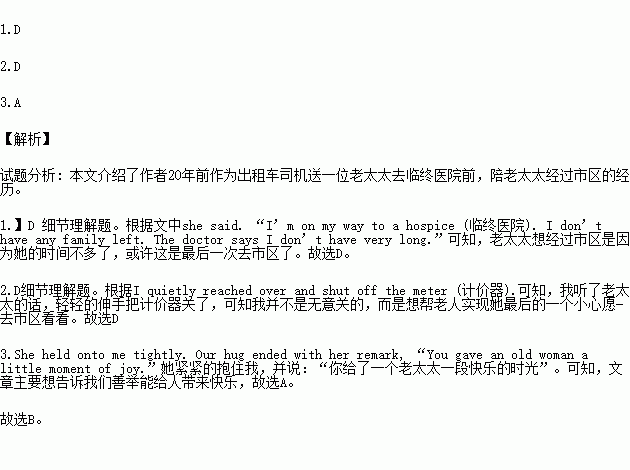题目内容
Twenty years ago, I drove a taxi for a living. One night I went to pick up a passenger at 2:30 AM. When I arrived to collect, I found the building was dark except for a single light in a ground floor window.
I walked to the door and knocked, “Just a minute,” answered a weak, elderly voice.
After a long pause, the door opened. A small woman in her eighties stood before me. By her side was a small suitcase.
I took the suitcase to the car, and then returned to help the woman. She took my arm and we walked slowly toward the car.
She kept thanking me for my kindness. “It’s nothing,” I told her. “I just try to treat my passengers the way I would want my mother treated.”
“Oh, you’re such a good man.” she said. When we got into the taxi, she gave me an address, and then asked, “Could you drive through downtown?”
“It’s not the shortest way,” I answered quickly.
“Oh, I’m in no hurry,” she said. “I’m on my way to a hospice (临终医院). I don’t have any family left. The doctor says I don’t have very long.”
I quietly reached over and shut off the meter (计价器).
For the next two hours, we drove through the city. She showed me the building where she had once worked, the neighborhood where she had lived, and the furniture shop that had once been a ballroom where she had gone dancing as a girl.
Sometimes she’d ask me to slow down in front of a particular building and would sit staring into the darkness, saying nothing.
At dawn, she suddenly said,” I’m tired. Let’s go now.”
We drove in silence to the address she had given me.
“How much do I owe you?” she asked.
“Nothing.” I said.
“You have to make a living,” she answered. “Oh, there are other passengers,” I answered.
Almost without thinking, I bent and gave her a hug. She held onto me tightly. Our hug ended with her remark, “You gave an old woman a little moment of joy.”
1.The old woman chose to ride through the city in order to ______.
A. show she was familiar with the city
B. reach the destination on time
C. let the driver earn more money
D. see some places for the last time
2.The taxi driver did not charge the old woman because he ______.
A. was in a hurry to take other passengers
B. shut off the meter by mistake
C. had received her payment in advance
D. wanted to do her a favor
3.What can we learn from the story?
A. An act of kindness can bring people great joy.
B. People should respect each other.
C. Giving is always a pleasure.
D. People should learn to appreciate others’ concern.
 津桥教育计算小状元系列答案
津桥教育计算小状元系列答案
